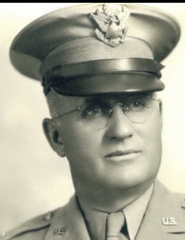Shells Interrupt Miles' Meal in Livergnano Area
By FRANK MILES
(Iowa Daily Press War Correspondent)
With the Fifth Army in Italy (IDPA) -- Capt William C. Gienne, Jr., Davenport, a medical officer, and Pfc. Andrew Schmid, of Dubuque, a tank destroyer crew member, were among the Americans who shared with me the thrill of being under nazi shell fire in the town of Livergnano.
Enemy front lines were 2,000 yards to the north.
American artillery to the south was heavily bombarding them and their supporting elements beyond.
Another correspondent and I were eating chow with an infantry company commander, in the one remaining room of a house near the foot of a cliff. To be polite we had removed our helmets to dine on steak, potatoes, peas, canned peaches, bread, butter and coffee in mess pans on our laps with only two table spoons as silverware and a lone canteen cup for drinking between us.
Replace Helmets
At the first explosion, the captain in command, a veteran of much fighting, quickly shifted his chunk of meat from this right to his left hand and put his iron hat back on with this right. We scribes did likewise.
"That one landed over in the center of town," said a GI knocking on a splintered chair.
The Jerries waited about five minutes then let us hear from them again with several shots in quick succession.
None of the shells landed dangerously close to us but Capt. Goenne, on duty at a aid station 300 feet away, and other officers and men in and around there, had narrow escapes.
Men Dodge Into Caves
Pvt Schmid and a group of comrades, who had been eating outdoors, made themselves reasonably safe by jumping back into caves at the base of a cliff where they were billeted.
I had talked with both Iowans before going to the captain's headquarters. In both conversations the principle topic was our homeland, to the terrific battle which was fought for days before Americans captured Livergnano. Time and again during two weeks prior to the seizure I had seen from ridges across a valley shells from our guns and bombs from our planes ripping Livergnanao in he American drive to expel the nazis from powerful positions.
"You tell 'em," grinned Private Schmid, replying to my questions whether he was going back to Dubuque when he got out of the army.
"My home town always looked good but never so good when I was there as it does from here," he added.
We correspondents left the captain to walk along a trail around the mountain to where two tank destroyers were planted. They had just finished firing 500 rounds.
Shells Land Nearby
"Quiet on this end though," said a bearded sergeant. "Jerries ain't thrown anything this way since 5 o'clock this morning."
"And that was a hell of a time to wake me up," grinned a GI.
Just then we ducked at sound of a menacing whistle and a moment later ducked again. The two shells landed in the road over which we had just jeeped into Livergnano. Needless to say, I had our jockey whip it up going back. He had dived into a cave down town when the shelling started.
As we drive out, a sergeant and two GI's were putting in a car two civilian fascists, who had been captured in a barricaded mountain hut.
When we reached press camp, an officer of the Fifth army public relations section, told me 11 nazi bodies had been found on a crest less than a mile away.
I learned through him that four Iowa warrant officers of the 34th division were en route home under the army rotation plan. They were William H. Seeger, Charles V. Jacoba, and High W. Jared, all of Council Bluffs, and James E. Outrim, Jefferson. The came overseas in April of 1942. All fought through Africa and in Italy up to the time we left. Each wore the coveted combat infantryman's badge.
Source: Muscatine Journal News-Tribune, Dec. 1, 1944
![]()

